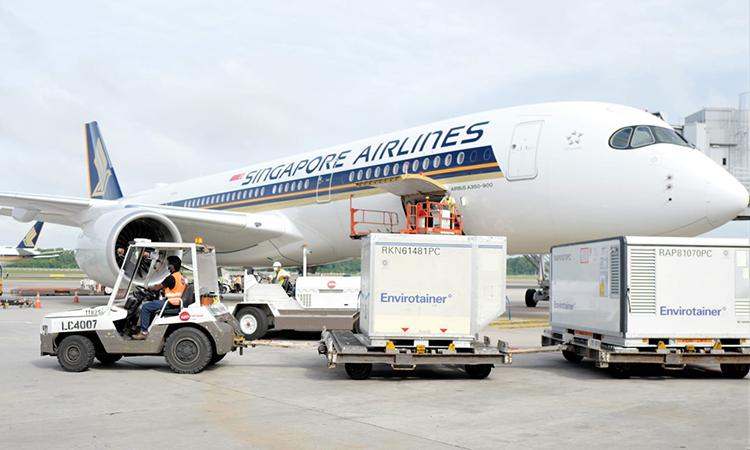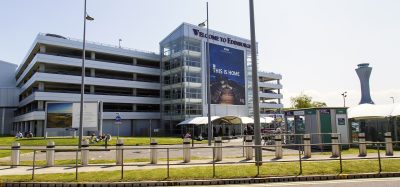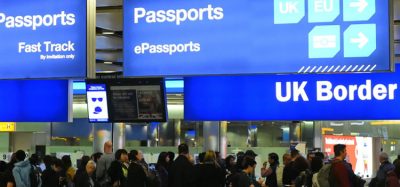Changi Ready Taskforce is well prepared for COVID-19 vaccine transportation
Posted: 10 December 2020 | International Airport Review | No comments yet
The Changi Ready Taskforce has been set up to better prepare the air cargo community to meet the logistical demands of vaccine distribution.


Credit: Changi Airport Group
The Changi Ready Taskforce – co-led by the Civil Aviation Authority of Singapore (CAAS) and Changi Airport Group (CAG) – has jointly announced that the Singapore air cargo hub is ready for the transportation and distribution of COVID-19 vaccines.
Comprising 18 members from across the Changi air cargo community, the taskforce is a public-private collaboration involving government agencies, cargo handlers, airlines and freight forwarders.
Director (Aviation Industry) at the Civil Aviation Authority of Singapore and co-lead of the Changi Ready Taskforce, Ho Yuen Sang, said: “Over the years, Changi Airport has built a strong track record in pharmaceutical handling by air from serving Singapore’s pharmaceutical manufacturing sector. We have good cold chain handling infrastructure and capabilities. With our strong air connectivity and Singapore Airlines’ fleet of more than 200 passenger aircraft, we can deliver vaccines to multiple destinations according to demand. We are well-positioned to play a critical role in distributing COVID-19 vaccines to Singapore and the region. By bringing all players in the air cargo supply chain together through the Changi Ready Taskforce, CAAS and our partners can ensure the safe, reliable and effective transportation of these vaccines”.
Join us live: Shaping the Next Generation of Hold Baggage and Air Cargo Screening
Join us live for an insightful webinar on 11th December at 14:00 GMT, in collaboration with Smiths Detection, as we explore the strategic balance of operational efficiency, regulatory compliance, and sustainability in high-volume security environments.
This session offers a focused look into future-proofing your security strategy.
Key learning points
- Cost Reduction: Strategies to minimize bag travel time while simultaneously reducing operational costs.
- Regulatory Roadmap: Insights into the next wave of regulatory changes and their impact on future investment decisions.
- Sustainable Systems: Practical approaches to building sustainability into security systems and lowering the total cost of ownership (TCO).
- Scalable Solutions: Real-world examples of scalable systems supporting current airport growth and preparing for tomorrow.
Register now for expert insights, case studies, and actionable strategies on operational efficiency!
Singapore Changi Airport (SIN) is a preferred pharmaceutical air cargo hub in the region. As the first and largest International Air Transport Association (IATA) CEIV Pharma-certified community in Asia-Pacific, with at least one member in each node of the air cargo supply chain, the Changi air cargo hub offers an unbroken cold chain necessary for the effective handling of temperature-sensitive pharmaceutical shipments.
Recognising that the distribution of COVID-19 vaccines is a challenging task, the Changi Ready Taskforce has been set up to better prepare the air cargo community to meet the logistical demands of vaccine distribution. This includes assessing and increasing the hub’s ability to handle different types of COVID-19 vaccines, all within stringent temperature-controlled environments to maintain the vaccines’ efficacy, as well as to manage an expected surge in the volume of vaccines to be air transported to the region, once they are approved by regulators.
Since October 2020, the Changi Ready Taskforce has sought to identify and address the potential challenges associated with the air transportation of COVID-19 vaccines – through workstreams, such as capabilities mapping of infrastructure and equipment, data visibility and processes – to ensure that the COVID-19 vaccines can be safely, reliably and efficiently handled through the Changi air cargo hub for distribution into Singapore and to the region.
Lim Ching Kiat, Changi Airport Group’s Managing Director for Air Hub Development and co-lead of the Changi Ready Taskforce, said: “The Changi air cargo hub has always placed a strong emphasis on pursuing the highest standards in pharmaceutical cargo handling. Given our efforts in infrastructure upgrades and manpower training over the years, our air cargo hub is well-poised to handle the transportation of COVID-19 vaccines”.
Temperature-controlled environment throughout the airport cool chain
Changi Airport’s cargo handlers – dnata and SATS – have steadily been enhancing their cool chain infrastructure and equipment over the years to support the growing demands for transporting temperature-controlled cargo: dnata’s CoolChain and SATS’ Coolport, which consist of temperature-controlled warehouses with adjustable temperature ranges between -25°C and +25 and round-the-clock shipment monitoring. In addition, both handlers’ facilities are equipped with essential surveillance systems to ensure the security of the cargo.
Handling vaccines that must be stored in a frozen or deep-frozen state may require dry ice. Changi’s cargo handlers have ready access to dry ice to cater to such shipments, along with trained personnel to handle them.
Robust air connectivity
Even though the COVID-19 pandemic has decimated air travel demand, resulting in a steep decline in passenger aircraft movements with a corresponding reduction in belly-hold capacity, Changi’s airline partners have been quick to ramp up charters and scheduled freighter operations since the onset of the pandemic.
CAG has also worked with its partners to facilitate the introduction and growth of passenger services for cargo conveyance to alleviate the air cargo capacity crunch. As of 1 December 2020, weekly cargo flights at Changi Airport have tripled to more than 950 flights compared to the end of 2019. Changi Airport is now connected to about 80 cities by weekly cargo flights.
Changi Airport is well-positioned to serve as a regional hub in Southeast Asia and Southwest Pacific to support the efficient distribution of COVID-19 vaccines. Singapore Airlines (SIA) operates multiple weekly flights from each of the key European pharmaceutical export hubs, such as Amsterdam, Brussels and Frankfurt, and has an extensive network in Southeast Asia and Southwest Pacific. In addition, leading global integrators – such as DHL, FedEX and UPS – have established their regional hubs in Singapore with strong network connectivity from Changi Airport.
Changi’s extensive air network is complemented by Singapore’s position as a leading sea-port. With seamless air-sea connectivity, Singapore will also be able to offer customised solutions for pharmaceutical manufacturers to distribute their vaccines into the region in the steady state.
Global Collaboration
Both CAG and SATS are also part of the global task force, Project Sunrays – a joint initiative between The International Air Cargo Association (TIACA) and Pharma.Aero. This project aims to create transparency between pharma shippers and the global air cargo industry and establish useful guidelines for the air cargo industry to ensure the proper handling, storage and transportation of high volume COVID-19 vaccines.
Stay Connected with International Airport Review — Subscribe for Free!
Get exclusive access to the latest airport and aviation industry insights from International Airport Review — tailored to your interests.
✅ Expert-Led Webinars – Gain insights from global aviation leaders
✅ Weekly News & Reports – Airport innovation, thought leadership, and industry trends
✅ Exclusive Industry Insights – Discover cutting-edge technologies shaping the future of air travel
✅ International Airport Summit – Join our flagship event to network with industry leaders and explore the latest advancements
Choose the updates that matter most to you.
Sign up now to stay informed, inspired, and connected — all for free!
Thank you for being part of our aviation community. Let’s keep shaping the future of airports together!
Related topics
Air freight and cargo, Airport crisis management, Airside operations, COVID-19, Workforce
Related airports
Related airlines
Related organisations
Changi Airport Group (CAG), Civil Aviation Authority of Singapore (CAAS), DHL, dnata, FedEx, International Air Transport Association (IATA), Pharma.Aero, SATS Ltd, The International Air Cargo Association (TIACA), UPS


















